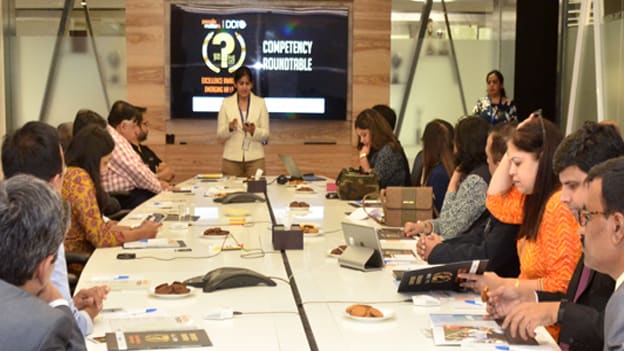Defining competencies for HR leaders of the future

When the senior leaders of an organization get together to select or groom promising young professionals who are primed to lead the talent management function for them in the future, what are the parameters on which they make the evaluations? Does an education from a premier B-School weigh more than years of relevant experience? Do they look for the latent potential in the candidate, or do they look for demonstrated success in the current role? To address all such questions and more, People Matters in association with DDI (and hosted at the MakeMyTrip office premises) organized a round table discussion, which was facilitated by Yuvaraj Srivastava (Group CHRO at MakeMyTrip) and Ashish Kaul (Senior Consultant, DDI) together. Following were the key points to reflect upon, which emerged from the discourse:-
Preparing leaders to support market disruption
In order to deal with the current disruption happening in the market, HR leaders need to be armed with the knowledge of all domains and industries, which necessitates them to have business acumen, as a competency. They also need to have a cross-cultural and geographical orientation, so as to understand the global business dynamics well, and anticipate the possible future disruptions too.
Finally, they need to have the cognitive ability and a data mindset for enabling change, by analyzing the available technology products in the market, and proactively adopting the emerging technologies.
Role of HR in driving digitization
First and foremost, the HR leaders of tomorrow need to be agile in their approach, so as to be able to propel the digitization agenda in their respective organizations. They must display agility in learning, gauging and adapting to new concepts and phenomenon, which points to the need for the change management competency.
To create a digital mindset or culture in their organizations, the HR leaders must be tech-savvy themselves, and should possess an analytical bent of mind to go with it.
Preparing leaders who foster innovation within organizations
The most important trait for anyone who aims to facilitate innovation, is his/her openness to divergent ideas. From this trait, it can be inferred that the competency needed for HR leaders who foster innovation, is that of coaching or of a performance advisor.
In addition to that, the leader must be comfortable with failures, and be able to pivot from them quickly, which again leads us to a need for agility in learning. Innovation is also linked with risk-taking, and thus an entrepreneurial spirit is a must for driving innovation in organizations. Design thinking can be used to propagate out of the box thinking, cultivate an idea orientation, and enable a design mindset among the change-makers of the organization. Hiring and developing a diverse workforce, with varied backgrounds and points of view can also help in accelerating the process.
Role of HR leaders in leveraging millennials
We all know how millennials bring in an element of dynamism and unbridled energy, to companies. In order to keep pace with them and truly leverage their potential, HR professionals should endeavor to build trust first, which can generate a sense of informality among them; something which they greatly relate to. The leaders should also have the ability to leverage communication on changing social formats and informal media like WhatsApp, Instagram, and Snapchat. Furthermore, in the ever-changing environment that the millennials bring with them and create, HR leaders should also be able to deal with ambiguity; again requiring the change management competency.
Role of HR in encouraging Diversity
As has been written earlier too, articulating the business case well is of paramount importance for furthering the diversity agenda; which brings the business acumen competency to the fore again. Emotional intelligence is another critical competency needed for those who intend to uphold diversity, which includes both mindfulness and empathy. Additionally, leaders should be able to build trusted relationships with employees, to create buy-ins for leadership, and also become role models for the workforce.
(The following excerpts are from the Competency round table discussion held at the MakeMyTrip office, as a part of the process for ‘Are You In The List? 2017’ Emerging HR Leaders Awards)

















